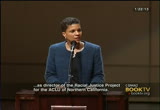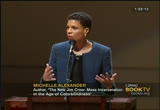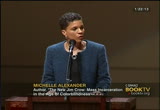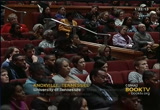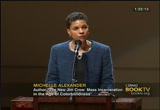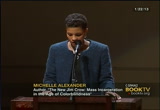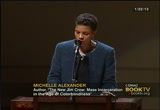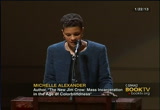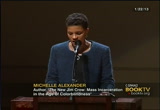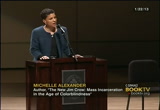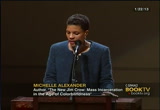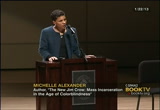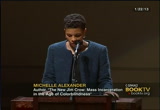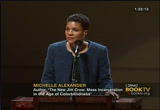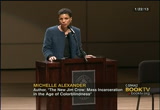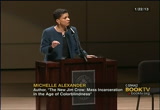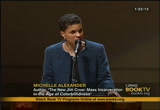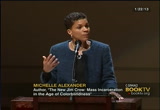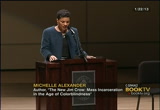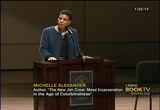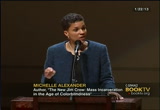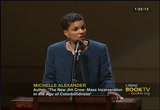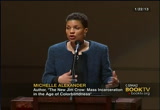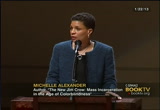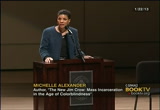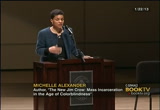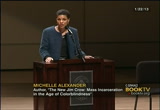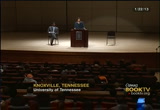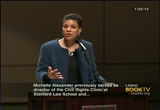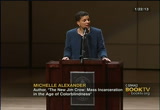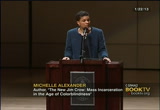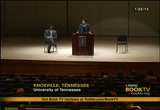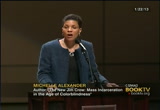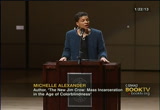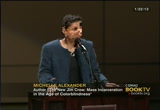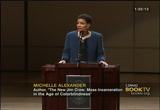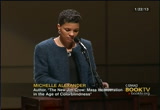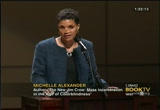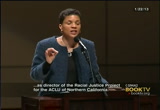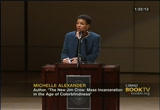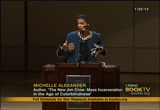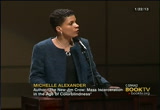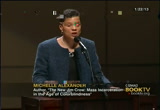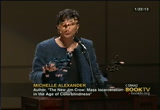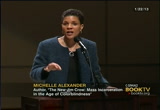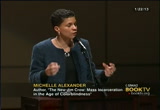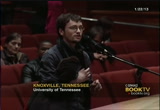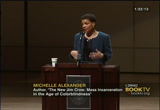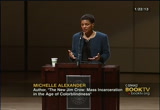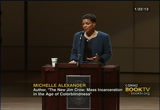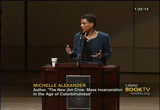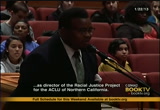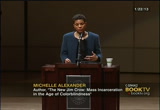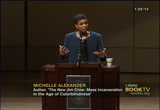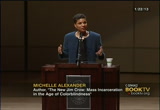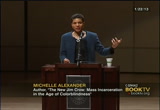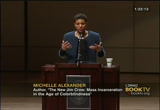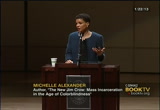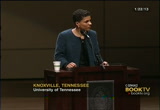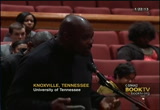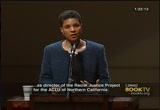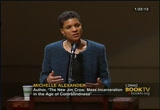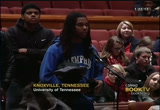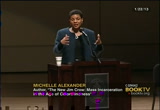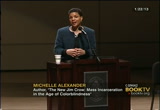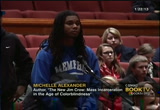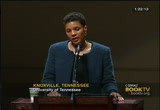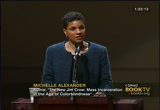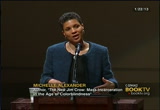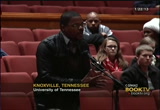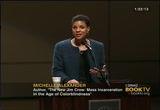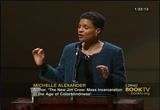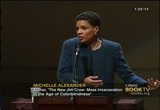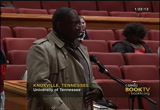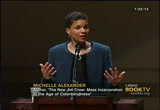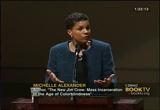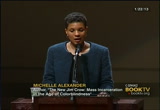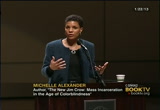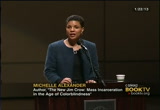tv Book TV CSPAN February 19, 2013 3:00am-4:30am EST
3:00 am
that many people in america will not think of dr. king again until his holiday rolls around again next year. but i would like for us to pause tonight and think more deeply about the meaning of dr. king's life and his legacy and what it has to teach us about our nation's president. it seems particularly important for us to do that given that this year marks the 50th anniversary of the march on washington. 50 years have passed since his voice soared over the washington monument, declaring his dream "i have a dream. it is a dream deeply rooted in
3:01 am
the american dream." yesterday while i was watching president obama's inaugural address, i heard echoes of king's speech i have a dream. and when i turn off my television set, i spent a few minutes reflecting on the question are all of us truly welcome to share in this dream come the same dream that dr. king dreamed? most americans i am sure can be cite portions of dr. king's i have a dream speech by heart. it's an extraordinary and very familiar speech i've grown accustomed to hearing clips of his speech played over and over are cycled over and over on the radio every january. they are the favorite quotes, the favorite lines. and now that i have school-age children i see how king has
3:02 am
explained to them in classrooms when i was in elementary school there was no martin luther king day, no discussion of his heroism in the classrooms but when my children came home from school just the other day, they told me all they had learned in school about his courage. she was the man who stood up to the police who believed the children of all colors and walks of life ought to be able to hold hands and be judged by the content of their character and not the color of their skin. he was willing to die so that all of us could live his dream. and i find myself conflicted as i listen to my children. to back to me what they've heard in school about this man believed in kindness and forgiveness and justice and compassion for all and i said yes, yes, all of that is true. all of that is true but i feel
3:03 am
uneasy. i know something has been lost in the translation. and that sense of disorientation was crystallized for me recently when i read vincent harding's's insightful book "martin luther king the inconvenient hero." dr. harding was one of king's closest advisers marching with him countless times and living around the corner from king's family in atlanta. harding rights with some sorrow, quote, it appears as if the price for the first national holiday honoring a black man is the development of a massive case of national amnesia concerning who that black man really was. i would suggest that we have chosen am nisha rather than continue his painful uncharted and often disruptive struggle towards a more perfect union. it appears, he says, as if we are determined to hold our new
3:04 am
hero captive for the powerful period of his life that culminated in the magnificent march on washington in 1963 refusing to allow him to break out beyond the stunning eloquence of his i have a dream speech. dr. harding rights we would like to forget that it wasn't the general sunni dreams of freedom shot down on the balcony in memphis tennessee. he was by 1968 a different even more courageous man ahead of his time. i can see that on days like yesterday we've rarely honor the man who died. we honor that the version of him, the man that gave this speech about black and white schoolchildren and dreams in integrationist dream.
3:05 am
but who was he five years later in 1968? who was that man killed on the motel balcony the was marching with sanitation workers and demanding economic justice, not mere civil rights, the man who would come to believe after the civil rights bills had already been passed come after the civil rights victories had already been one of our biggest battles, the most important battles still lie ahead and that nothing short of a radical restructuring in our society held any hope for making the dream and promise of america a reality for all of its citizens. he explained the 1967 quote for years i labored with the idea of reforming the existing institutions of the society a little change here and a little changed there. now i feel quite differently.
3:06 am
if you got to have a reconstruction of the entire society, a revolution of values. frustrated by the white resistance to the dressing in any meaningful way decayed to get those, failing schools, structural joblessness and crippling poverty he told his staff at the southern christian leadership conference, quote, the dispossessed of the nation, the poor, both white and negro live in an unjust society. they must organize a revolution against that in justice, not against the lives of their fellow citizens but against the structure through which the society is refusing to lift the load of poverty so what would he think of us today of the world that we have created in his absence? what he believed the nonviolent revolution had already been one, had even begun?
3:07 am
the revolution of the values that he prayed for what he if he could see us today believe that we now share his dream and we are not traveling the road he was marching? 50 years later half we caught up with him yet? are we finally on the path he was traveling in 1963, 1968? back in 1969 while blood still stand the motel balcony where he was murdered, a poem was written honoring his life and reflecting his death and was written back when he had only just begun the process of being transformed in the collective consciousness from a troublesome figure to a national hero. it was written we that when the memory of his assassination was still fresh, tears still spilling among those that loved
3:08 am
him. back then in 1969 the poet pennoyer this polemic reflecting on his death and he wrote now that he is safely dead of let us praise him. build monuments to his glory and sing honor to his name. dead men make such convenient heroes they cannot rise to challenge the images we would fashion from their lives and besides, it is easier to build monuments than to build a better world so now that he is safely dead, we would ease consciousness and teach our children that he was a great man knowing that the cause for which he lived is still a cause and the dream for which he died is still a dream. now that he is safely dead, martin luther king jr. is it
3:09 am
true? is he safely dead today? is his dream safely dead? i know that many people in this room would say no, no, dr. king's dream and spirit is still so much alive among all of us it is thriving right here in this room and what better evidence could there be of this fact than that we as a nation pause to pay tribute to his dream. just yesterday in national federal holiday, think about that a national federal holiday for martin luther king jr., the man who was once deemed a threat to national security by the fbi, a radical troublemaker is it not obvious that we have finally caught up with him? we may not be living his dream but don't be at least share it?
3:10 am
what better to become better evidence could there be than we just we elected the nation's first black president, something that was unimaginable in 1963 or 1968. what better evidence could there be than that beautiful multi racial, multi-ethnic gathering on the mall in washington, d.c. that we witnessed just yesterday and was broadcast around the world. clearly we must be living or sharing the dream, right? it has been said by numerous philosophers and theologians that any society on the organization must be judged how it treats its most vulnerable members and prisoners. king would no doubt agree on that assessment and considering how we fare in that regard, i find myself thinking of people like susan, people who cycle in and out of the nation's prison
3:11 am
system in this era of mass incarceration in the post civil-rights era of perham half when the population is quintupled and millions of people overwhelmingly poor people of color have been permanently locked up or locked out and stripped of the civil and human rights but some even tried for. i think suzanne whose son was killed by the police. the cruiser barreling down the street in los angeles ran over her 5-year-old. she received no apology, no acknowledgment of her loss and she fell into a deep depression and she ultimately became addicted to crack cocaine. if susan had been a wealthy, if
3:12 am
she had even been middle class with a good job and a good health care plan, she would have qualified for many hours counseling and she would have qualified for a very good legal prescription drugs that would help her cope with her depression and grief but no, things were different for her. impoverished, living in l.a., she became addicted to crack cocaine and that began her odyssey of cycling in and out of prison for 15 years. 15 years. every time prosecutors said just take the deal. we will give you three years rather than eight. this time we will give you five years rather than 12th.
3:13 am
this time we will cut to a break just take the deal and we will give you two years rather than six. one of the deal after another never offer drug treatment only shown to a prison cell. every time she was released and pushed on to the streets unable to find work, no housing, often sleeping on the streets, cycling in and out of the prison system for 15 years until bayh no small merkel she was granted access to major treatment facility she got queen and was given a job and decided she was going to dedicate the rest of her life to ensure no other woman would have to go through what she went through and she began meeting
3:14 am
when many prisoners as they would get off the bus on skid row, get off the bus carrying nothing but a cardboard box carrying their belongings with little or no money turned out on the street as she would say just come home with me you can sleep on my couch you don't have to turn to the streets. i will take care of you and give you a safe place to read just come home with me. suzanne now runs five see films for women and los angeles, released from prison. her organization is called a new way of life, she helps find jobs, helps reunite women with their families and beyond that, she's organizing formerly incarcerated people to demand the restoration of their basic civil and human rights. clearly susan has caught.
3:15 am
but what about the rest of us? what i have to say will not be popular. it's not the message that is expected on the day after we unaudited for the first time the nation's black president but i believe it to be the truth and it implicates me and everyone in this room and the truth is we have allowed a human rights nightmare to occur on our watch. in the years since dr. king's death, a new system of racial and social controls has emerged from the ashes of slavery and jim crow. a system of mass incarceration that no doubt has dr. king turning in his grave today. the mass incarceration of poor people of color in the mize states is tantamount to the new
3:16 am
system that's shoveled our young people from underfunded the schools to brand new high-tech prisons. it's a system that locks up poor people, overwhelmingly poor people of color into a permanent second-class status nearly as effectively as earlier systems of racial and social control once did. it is in my view the moral equivalent of jim crow. i'm always eager to admit there was a time i rejected this talk out of hand. i rejected comparisons between the mass incarceration and slavery believing that those kind of claims and comparisons were exaggerations and distortions, hyperbole. in fact there was a time i thought people that made those kind of claims and comparisons were actually doing more harm than good to the efforts to reform our criminal justice system and achieve greater
3:17 am
racial equality in the united states. but what a difference a decade means. for after years of working with the civil rights lawyer and advocate representing the victims of racial profiling and police brutality in the investigating patterns of drug law enforcement in the communities of color and attempting to resist people who've been released from prison re-enter into a society that have never shown much use for them in the first place i had a series of experiences that began michael my awakening. i began to awaken to a racial realities that is just so obvious to me now but what seems odd in retrospect is i could have been blind to it for so long as i write in the introduction to my book what has changed since the collapse has yet to do with the basic structure of our society than
3:18 am
the language we use to justify yet in the era of color blindness is no longer socially permissible to use race explicitly as a justification for discrimination and exclusion and social contempt. so we don't. rather than rely on the race we use our criminal justice system to label people of color criminals and engage in all the practices that we left behind. today it is legal to discriminate in all of the ways it was launched an illegal to discriminate against african-americans. once you're labeled a felon, this employment is commission for housing discrimination, denial of the right to vote, exclusion from jury service. as a criminal you have scarcely more rights and less respect than a black man living in alabama at the height of jim-crow. we haven't ended their racial
3:19 am
cast in america. we have merely redesigned it. for those who might think that is overstating the case, consider this. there are more african-american adults under congressional control today in prison or jail on probation or parole them were enslaved in 1850 a decade before the civil war began. as of 2000 for more black men were disenfranchised them in 1870 the year of the 15th amendment was ratified denying the right to vote on the basis of race. the 15th amendment prohibited all explicitly denied the right to vote on the basis of race but during the jim crow era the taxes and literacy tests circumvented the 15th amendment and operated to deny
3:20 am
african-americans a chance to vote. well, today and many states the disenfranchisement and literacy tests ultimately could not. this doesn't affect just a small segment of the african-american community. to the contrary in many large urban areas today, more than half of working age african-american men now have criminal records and the subject is to legalize discrimination or for the rest of their lives. in fact in some cities like chicago, baltimore, philadelphia, d.c., the list could go on, in some cities the statistics are worse. in fact it was reported in chicago but if you take into account prisoners, if you bachelet count prisoners as people and keep in mind that
3:21 am
prisoners are excluded from poverty statistics and unemployment data that is masking the severity but if you actually count prisoners townspeople in the chicago area, 80% of working age african-american men, criminal records to legalize discrimination for the rest of their lives. these men are part of a growing undercast, not class, a group of people defined largely by race relegated to permanent second-class status by law. now i find today that when i tell people i now believe that mass incarceration is like the new jim crow people react with a completed this believe they say how can you say that? our criminal justice system
3:22 am
isn't of crime control and of black folks would stop running around committing so many crimes we wouldn't have to worry about being locked up in the civil and human rights. there lies the greatest myth about the mass incarceration that's been driven by crime and crime rates it's not true. it's just not true. our prison population quintupled in the space of 30 years. we've gone from a prison population is about to re-enter thousand to a population of over 2 million. we have the highest rate of incarceration and the world with even highly repressive regimes like russia or china or iran but this cannot be explained by crime or crime rates. no. during the same period of time
3:23 am
that our incarceration rates increased exponentially, crime rates fluctuate, went up, down, back up again, down again, and today as bad as they are in many parts of the country, nationally the crime rates are at historical lows. but incarceration rates at historic the sword. most criminologists and sociologists today will lead knowledge crime and acceleration rates in the united states have moved independently of one another. incarceration rates especially black incarceration rates have soared regardless whether the crime is going up or down in any given community or the nation as a whole. what explains the sudden explosion in incarcerations? the birth of the system unprecedented in world history sent crime and crime rates well the answer is the war on drugs
3:24 am
and the get-tough move meant the way the putative mess that washed over the united states. drug convictions alone accounted for about two-thirds of the increase in the federal prison system and more than half of the increase in the state prison system between 1985 and 2000 to the greatest expansion of our prison system. to get a sense of how large the contribution of war on drugs has made to the mass incarceration, consider this. there are more people in prisons and jails today just for drug offenses than were incarcerated cahal in 1980. most americans violate the drug law in some form in their lifetime, most do. but the enemy and know for mack has been racially defined to
3:25 am
feed not by accident. this has been waged almost exclusively in the poorer communities of color even though studies have consistently shown now for decades contrary to popular belief, people of color do not use or sell illegal drugs at higher rates. that defies the basic stereotype of to a drug dealer is. picture in your mind a drug dealer, and redo you see? there's been studies conducted asking that particular question. in the mid 1990's a survey was conducted asking people to close their eyes and imagine a drug criminal to report what they saw to it over 95% of respondents pictured someone african-american. only 5% pictured someone with any other racial or ethnic
3:26 am
groups. so when we think of drug criminals and the united states, think of people who are black and brown but studies have consistently shown people fall races use and sell drugs at remarkably similar rates and in fact the significant differences can be found some studies suggest that might views are likely to engage in the illegal drug dealing than black youth but that isn't what you would guess by taking a peek in the nation's prisons and jails which are overflowing with a black and brown drug offenders and in some states 80 to 90% of all of the offender's sent to prison have won the race. african-american. i know many people that see the data think that is a shame, but
3:27 am
we need to get tough on those folks in the hard because that's where the violent offender can be found. maybe people don't realize that this drug war has never been aimed at rooting out the violent offenders of the drug kingpins. no, federal money has flowed in the war to the state and local law enforcement agencies that boost the sheer number of drug arrests. it's been a numbers game. law enforcement agencies have been reworded in cash for the numbers of people swept into the system for drug offenses which helps explain why so many police officers go out looking for the so-called low hanging fruit tossing as many people as possible to get their numbers up and to make matters worse, federal law allows the state and local law enforcement agencies to keep for their own use of to
3:28 am
80% of the cash, cars, homes seized from suspected jar defenders they will just be suspected of a drug offense and the law enforcement can take your cash indices your car. it's a granting a direct monetary interest not in ending the drug abuse or drug addiction or drug related crime, but in the longevity of the war itself and the results have been predictable. people of color have been the arrested in the primarily nonviolent drug offenses. in 2005, flexible they were simple possession only one out of 54 sales. most people in state prison have no history of the violence or even significant selling activity in the 1990's the period of the greatest escalation of the drug war nearly 80% of the increase in the drug arrests were for
3:29 am
marijuana possession. a drug that's been shown to be less harmful or less addictive than alcohol or tobacco and if not more prevalent the middle class white communities and on college campuses. but by waging the war almost exclusively we have managed to create this undercast. where has the supreme court been in all of this? where has the u.s. supreme court then? far from protecting the interests of discreet and insular minorities, far from doing that, the supreme court has been busy defending a war at every turn. the - u.s. supreme court over the last couple of decades has a disarrayed the protection
3:30 am
against unreasonable searches and seizures granting to the police the authority to stop, chris, search just about anyone, anywhere, without any probable cause or reasonable suspicion not a shred of evidence of criminal activity as long as they get consent. now what is consent? it's when a police officer walks up to a young man. officer walks up to a young man with a hand on his gun and says to put your arms up in the air so i can see if you have anything on you. that young man just waved his fourth amendment rights against unreasonable searches and seizures law enforcement doesn't have to have a shred of evidence to support but not the young man has consented of course believing that he really had no ability to refuse consent and walk away.
3:31 am
3:32 am
even stateh system today.l prilin cases that i was urhad to close the racial bias at everyce process srom thoininand in somany ways the effecti from judicial scrutiny for the y the u.s of again to the defense of earliero into the system with litt hto he bodies are thethere is jus h beu have beenimin or fallen, yointol
3:33 am
rights movement no long you may be deni vote for years orstate that you jury servers for the rest life n felon. for e discriminaion d employmenlegal u you wod be forced to check the sng the dreaded question have felony. it doesnorata few months ago or 45ars ago foou r to cht your application is f ron it'se say to me for peopl.
3:34 am
3:35 am
3:36 am
3:37 am
3:38 am
american. years sidr. ea, our nation was facith we could continue downraveling,h of forgiveness, and we could choose the path of the poor movement to and we of theprayed could take a more filiar when it comes to matterse, he road look back vision, punitivemiss. mass incarceration and they will was there. prison the dreaand
3:39 am
3:40 am
3:41 am
3:42 am
3:43 am
3:44 am
3:45 am
3:46 am
3:47 am
3:48 am
3:49 am
3:50 am
3:51 am
3:52 am
3:53 am
3:54 am
3:55 am
>> is this? >> he made a believer out of me. interesting to hear their rates are higher than what north korea reports -- >> we are the world leader of imprisonment. >> my question is among them on drug related incarcerations, is there still a racial bias? >> the racial bias can be found at every stage of the criminal justice process and while some
3:56 am
of this clearly, you know, is related to conscious intentional bias that is unstated but nonetheless held, i believe that much of it is an unconscious in stereotyping. police officers that sees a group of young men walking down the street with their pants hanging down and they think to themselves i'm going to jump out, frisk them come see if they have anything on them, with good intentions, i'm doing my job to keep the neighborhood safe. now, the same officer may see a group of white kids walking down the street and the thought never crossed his mind to jump out of the car and have the kids spread-eagled on the pavement frisking them to hold any evil intent to those young black men.
3:57 am
but he looks like a criminal and seems like they are up to no good played out over and over again. there are studies published in the "san jose mercury news" for example showing that prosecutors displayed the considerable bias charging the decisions about who seems like they should be given a good deal, who is worthy of a second chance, who seems like there's somebody that is just a tough kid that can't be turned around and the book should be thrown at him. so this plays out in the crimes and types of offenses. so when we talk about violent crime, i think it is important to race of the violent crime are much higher among black men than white men. the rates of violent crime are much, much higher.
3:58 am
3:59 am
>> we supposedly do all of in this the name of safety. so we have a system of mass incarceration that exists supposedly to make us all safer, and yet it insures that the norm of population will be locked out of employment, locked out of housing and trapped in a perpetual undercaste, and then we stand back and express surprise that rates of violence and other crimes are higher in those communities. and, in fact, i think we have to ask ourselves why on earth would we create the very conditions that we know are likely to create violence? why are we so willing to invest in building prisons rather than many job creation and education -- in job creation and education, the very things that we know are the ingredients of healthy, thriving, safe and caring communities? so i think that it's important for us to recognize the ways in which bias plays out, you know, in many all these discretionary
4:00 am
decisions that are made throughout the system. but it also plays out in how we as a nation invest our resources and who we are willing to treat as disposable and who we view as having a future and deserving of the kind of resources that will insure them, you know, a path of meaningful opportunity. >> thank you. that answers my question. >> thank you. [laughter] [applause] >> hi. >> good evening, professor alexander. i had a quick question. you say that we need a revolution. so my thing is during the, um, era of jim crow you noticed that the financial hardship of creating separate but equal kind of helped to break down the system of jim crow, started writing laws that we couldn't, that america couldn't fund separate but equal laws, schools or classroom settings. so with this era of mass incarceration, what are some of
4:01 am
the economic kind of things we can use to break down the system? because what you're saying, those kind of like, this has helped, this is added to because people are getting paid off of this and money is getting put into this. so how can we hit them in their pockets kind of thing? >> yes. it's a good question, you know? i think it's important, first, though to emphasize that jim crow didn't collapse because it was too expensive to provide equal educational opportunities for black folks as compared to whites. there was no effort to try to provide equal educational opportunities for black folks in a separate system as compared to whites. what led to the collapse of jim crow had a lot to do, um, with how the united states was being viewed in the aftermath of, you know, world war ii, um, when black, you know, servicemen were returning home from fighting for
4:02 am
freedom abroad and returning home to suffer second class status and being hung from trees in the south, and these events were being broadcast around the world, you know, tarnishing america's image as leader of the free world and standing up, you know, against tyranny. and jim crow collapsed because of a mass movement that arose that shook the foundations of the system itself. but i agree with you that we can weaken the foundations of any system of control by challenging its economic base. and that certainly was one of the strategies that led to the collapse of apartheid in south africa, the divestment movement, um, you know, urging, you know, universities to divest from south africa, corporations to divest from south africa, you know, scared the daylights out of, you know, the south african
4:03 am
government as they feared, you know, investment being pulled from their country in moral outrage over the apartheid system that existed there. and there are young people today who are talking about pursuing divestment strategies in the era of mass incarceration, meaning divesting from private prisons. the united methodist church, actually, the national united methodist church just announced that they have decided to divest from private prisons. you can say, well, what is a church doing investing in private prisons in the first place? well, you know, churches invest in pensions and mutual funds, right? and very often we don't even know what companies our mutual funds are invested in. well, private prisons have become profitable, so many investment portfolios now include private prisoners as one of the profitable companies that any institution ought to invest in. um, and so you can wonder, you
4:04 am
know, is this institution that we're in invested in private prisons? i don't know. >> they are! >> what churches are invested, have funds in private prisons? so i think a divestment campaign, um, urging universities, churches, corporations to divest from private prisons directly as well as any mutual fund or pension plan that has even one penny invested in private prisons could be very helpful in crippling the private prison industry. but more importantly, i think it canning be a tool for raising consciousness -- it can be a tool for raising consciousness, raising awareness about the system of mass incarceration as whole. i believe that fewer than one in ten prisoners today are held in private prisons, so even if we got rid of private prisons, we would still have a system of mass incarceration told. um, but i think that those kinds of divestment campaigns help to raise consciousness and can be
4:05 am
an important part of movement building as well as boycotting companies that will not hire people with criminal records, you know? there have been a number of companies that have courageously said we are going to hire people who have felony records, we're going to give people a fair shot, um, at employment, and if we begin to celebrate and honor those companies while publicizing those companies that won't give people even a chance, um, at an interview, even a chance at getting in the door, um, you know, i think that can be something else that helps to raise consciousness and contribute to movement building. but ultimately, i don't believe that this movement should be about dollars and cents. ultimately, this -- we have got to find a way to build a new moral consensus and build on the work that dr. king was doing and, um, you know, force all of us to reckon with what we have done and inspire genuine care, compassion and concern, um, for
4:06 am
the least advantaged in our society. so i think it can -- what you're describing can be a part of that, but we can't reduce the movement to dollars and cents. >> right. thank you so much. >> um, in your book you mentioned several judges who have given up their courts, who have resigned because of the harsh sentences they're expected to give for drug offenders. have any of those judges stepped forward as leaders? have any of those judges said my experience gives me, gives me a perspective, gives me a sounding board where i can lead people into some of this revolution? >> yes. well, there's a wonderful organization that i would recommend, um, people to check out which is called leap, law enforcement against prohibition. this organization is comprised entirely of, you know, judges, prosecutors, police officers, police chiefs who now believe that the drug war has caused
4:07 am
vastly more harm than prohibition itself. um, and these are people who spent their lives, often their careers as drug warriors and have come to the conclusion, um, that the harm caused by the drug war is so vastly outweighed by any potential benefits that it has to be abandoned in its entirety. and so you can check out their web site. they have a lot of great resources, videos, um, you know, and the like that really feature some, you know, important voices within the law enforcement community calling for a change in course. >> yeah. thanks for pointing us to some leadership. >> thank you. >> hi, doc. growing up a poor man in my younger age, and i was just sitting here thinking about how blessed and fortunate i am to not be in the system. >> uh-huh. >> but i also have some acquaintance, people who i do know that is in the system sort
4:08 am
of by mistakes. and you wonder, these are good people. >> uh-huh. >> so how do we determine now, i know you spoke on, you fill an application out, and you put in that, yes, i'm a criminal, yes, i've been to prison. how do we get to this point where we can give them a second chance? that's why i can't understand, because my heart really hurts for that -- there's one particular guy who i know is a great guy, made a very serious mistake. really, he didn't make the mistake, he was just caught up with the person. the person that made the mistake. but he's also paying the price. >> uh-huh. >> so how do we turn this around to give this person a second chance? >> well, i think, you know, first i am a supporter of ban the box initiatives. ban the box campaigns are campaigns that have been successful in a number of cities
4:09 am
and jurisdictions to remove the box on employment applications asking the question "have you ever been convicted of a felony." i believe the city of philadelphia has now removed that question from all city employment applications. there are a number of jurisdictions around the country, cities, counties that have embraced the ban the box movement and have removed the box from employment applications. now, of course, employers may then still consider prior criminal history once the person has had an interview. but what removing the box does is it gives people a chance. gives people a chance to at least get an interview, to get their foot in the door so that they can make their case that they deserve a chance and that whatever mistakes they may have made in the past, um, do not be bear upon the current job they're being asked to perform
4:10 am
or that they are well beyond the type of activity that landed them in jail in the first place. and so i think everyone should have that shot. and i also think that, you know, the reality is, you know, for people who are convicted of drug offenses, you know, they're in a position that, i think, is unfair vis-a-vis those who drink alcohol regularly or who are alcoholics. you know, you have people who have alcohol problems, who struggle with alcoholism, they don't check any boxes. there's no background checks that reveal their history unless they've been caught in this a dui or something like that. and so my own view is that, you know, people who, you know, have some kind of drug-related conviction, these are the types of things that shouldn't be held against people because they happened to be caught. the odds are so vastly higher that you might get caught if
4:11 am
you're a poor person living in a ghettoized community as as as od to someone living on a college campus who everybody thinks, oh, they're just kids, and they'll grow out of it. we really have to be very careful about the extent to which we view criminal convictions as even relevant to the particular types of jobs that people are applying for today. and i support a very strong kind of anti-discrimination position against people who have prior criminal records unless it is directly relevant to the type of job they're applying for. >> thank you. >> hey, how you doing? >> hi. >> my name's maurice, and i want to thank you for coming. and one of my questions -- well, my question is, um, for a student or anybody else out here in the crowd who wants to get more involved actively in the progression of this movement, what can we do other than, um, informing other people of what's actually going on and doing more
4:12 am
research ourselves? what can i do to get active in the movement? >> excellent question. um, one thing you can do is think about forming a students against mass incarceration organization on campus. these groups have been forming on numerous college campuses and universities around the country, um, and, you know, there's one at howard, there's one at columbia, there's -- they're growing. and, in fact, you can go on my web site, which is newjimcrow.com, and get contact information about who to contact can about kind of joining that effort and linking up with other student groups around the country who are wrestling with exactly the same question of how can young people begin to play a meaningful role. it takes some leadership in building the movement to end mass incarceration. and on the web site i also list a bunch of resources and organizations that you consider contacting, um, you know, that you could begin to work with if you choose and if they are doing work here locally. um, but i really do think that
4:13 am
the priorities are, you know, consciousness raising, working toward, you know, supporting people as they are released from prison so finding out in your community what are the reentry centers, you know, what forms of support can be provided and then, also, getting to work with organizations like the drug policy alliance and, you know, many other organizations that are operating nationally, um, to repeal harsh drug laws that exist, you know, here in this state like other states, um, to get involved in ban the box initiatives, repeal, you know, bans on food stamps. all of the types of things i described. there are people undoubtedly who have already begun some of that work locally, and if they haven't, to really think seriously about forming your own organization. one of the things that worries me most about, you know, this point that we're in in building
4:14 am
the movement is that there really is no grassroots organization that exists today on a national level that has as its primary mission ending the system of mass incarceration. and so some of the work that needs to be done may not have begun in your community. but who is going to do this work if not you? if not us? so we've got to begin somewhere, and so i encourage you to check out my web site for a list of organizations and resources, um, think about forming your own student organization here and then, also, get together with like-minded souls and think seriously about what kinds of organizations need to be built, perhaps, you know, in your own community to do the work that lies ahead. so thank you for your question. >> thank you. >> yes, um, i would just like to thank you for your presentation. it was very insightful. the question i would like to ask
4:15 am
is that, um, overall typically when many young persons are arrested for drugs, they tend to level a lot of charges against them. one such charge which is very difficult to beat is conspiracy. >> uh-huh. yes. >> conspiracy to sell drugs. and a barber of mine in jamaica who was deported told me that conspiracy is one of the hard charges to beat. what sort of solutions do you propose to -- i don't know if to remove such a charge from the book? because conspiracy can be applied in such a broad way. >> thank you so much for raising that question, and, you know, um, many people don't realize, um, until you're charged as being part of a conspiracy that something as simple as passing
4:16 am
messagings to someone. oh, so and so called. he wants you to meet him there. oh, you need a ride? okay, i'll give you a lift. and you may have some vague sense of what's going on, or maybe you don't really know what's going on. but the prosecution sure thinks you do. and, um, it takes one overt act in support of the conspiracy, and an overt act could be giving someone a ride. it can be passing messages. um, you know, it can be, um, something extremely minor. and many women find themselves charged as co-conspirators because the prosecutors are really after their boyfriend or their husband or some man that they know who they think is involved in drug conspiracy, and so they are charge them as a
4:17 am
co-conspirator in order to try to get them to snitch on their friend or loved one. and, unfortunately, many women who either don't actually have the knowledge to be able to snitch or because of their own conscience won't allow themselves to snitch on someone, you know, they care about find themselves doing far more time than the person who is charged as a principal in the crime. so these conspiracy laws are very dangerous and unjust and ought to be changed. and conspiracy laws, just like drug laws themselves, can be changed. it requires a demand, it requires organization, it requires us to become educated about the nature of these laws and insist that legislators, um, do what it takes to insure that people, um, are not end snared by them in the ways that you
4:18 am
describe. >> thank you. >> thank you. >> hi, folks, we only have time for, like, three more questions, so we'll take the first question starting here and then go back and forth. >> okay. >> hello. thank you for coming. >> thank you. >> i think your message needs to continue to spread, but i would be remiss if i did not talk about my -- [inaudible] surrounding this topic. as i was sitting there, there was just so much going through my mind, i had a lot of internal conflict. and so i guess i'm thinking about this, this possibly should be an internal black community discussion. there's still this notion of personal accountability -- >> uh-huh. >> -- that i'm thinking about. >> uh-huh. >> and i guess my question is, does that play a role in this mass incarceration movement? because i have a lot of family members and friends who know better and continue to not do
4:19 am
better. >> uh-huh. >> and make bad decisions and don't hold themselves accountable. and so part of me is still struggling with how do we balance the act of the external things versus the internal? so does personal accountability play a role in this, and how do we really deal with this movement? >> excellent question. and, you know, i think personal accountability plays a role in it for all of us. you know, we all have to take responsibility for the choices that we make in our lives. but we also have to take choices -- take responsibilities for the choices we make collectively. and, um, it seems to me that we have been willing to heap an enormous amount of shame and blame on the poorest, the most vulnerable in our society and accept no responsibility
4:20 am
collectively for having set people up to fail and then keeping them trapped. so, yes, yes, of course, everyone has got to take responsibility for their own actions. there is absolutely a role for personal accountability in the conversation. um, but i think we've got to expand the conversation beyond personal accountability and ask the question, okay, so you've made a mistake, now what? and the reality is that people of all colors make mistakes. and, in fact, we make many of the same kinds of mistakes. but some people are punished so harshly and in an unrelenting fashion. and some people who make the same mistakes, like president barack obama, go off to college, go on to law school and get to be president of the united states.
4:21 am
right? so i think we've really got to be willing to look at the kinds of mistakes people make with an open heart, an open mind and make choices about how we respond to those mistakes in a way that honors their humanity, their dignity and is based in awareness that, yes, as a society we need to be safe. we need to honor people's basic human rights to be able to live in a community that is safe and secure. you know, a child growing up in a crime-ridden, violent community who has to worry about, you know, bullets flying through the air near her school, her human rights are being violated. because we have not provided her a safe, secure environment in which she can live and grow. so we've got to hold each of us individually accountable, um, and do so in a way that honors each other's basic humanity and basic human rights, assures that
4:22 am
we create safe and thriving communities, caring communities. but we can't simply resort to shame and blame and get caught up in a wave of punitiveness that makes us less safe and, ultimately, denies the basic humanity, um, of those we claim to care about. >> thanks. >> thanks. >> thank you. my name is james lewis, and i'd like to just thank you for bringing this presentation to this area of the country. i think it needs it more than most of the areas, especially here in this area. but i have a concern, and i really like your approach that you've taken to this. it's like a root cause analysis of what has caused the massive incarceration of so many african-americans. and that you've used data and statistics to lay out. my question has to do with where is the african-american churches when it comes to getting involved? what has happened to them? we seem to run from data, we
4:23 am
seem to run from root cause analysis. we seem to just become so lackadaisical in this area. what would you recommend to churches and to the church leaders as what we should be doing to address this issue? >> yes. thank you. i, i agree that people of faith and conscience have such an extraordinarily important role to play. at this moment in our nation's history, at a time when so many people of faith -- including myself concern you know, we claim to care a lot about compassion and forgiveness. um, we claim, we talk a good game. [laughter] you know? but then when it comes to being willing to stand up existence these kinds of injustices, for too long too many people of faith and conscience have remained silent. i am encouraged, though, you know, in recent years faith
4:24 am
leaders are waking up and standing up. the samuel dewitt proctor conference which is a network of several thousand progressive black churches has actually decided to make ending mass incarceration one of their primary, um, missions, you know, for the foreseeable future. and they actually created a faith-based study guide for my book to be used in congregations, um, to raise awareness and to encourage people to explore the relationship between their faith and their spiritual commitments, um, and what we see in this era of mass incarceration and to encourage people to find their prophetic voice in this time of crisis. and so there is movement afoot within faith communities, um, picot is a multiracial, multiethnic, you know, faith-based social justice organizing network that is now embracing ending mass
4:25 am
incarceration as one of their main goals. so there is change in shifting at to -- attitudes within the fh community, but i couldn't agree with you more that much, much, much more work needs to be done. and ultimately, you know, being the world's leader in imprisonment, locking people up and subjectings them to second class status, if that is not a moral issue, a spiritual crisis to which the church ought to speak and respond, i don't know what is. um, and so i hope that people like you will encourage, um, you know, the faith leaders, you know, who you know and in your circles of influence, um, to begin to speak up and speak out with some courage. >> thank you. >> thank you. >> this'll be the last question. >> okay. >> hello. my name is jaylan, and i -- my
4:26 am
question was similar to maurice's, and i understand how you said, like, bring organizations into colleges might help. but i feel like the most powerful thing right now is the media. like, how do we get, like, you don't really see too many black leaders teaming up together to help young black people find the truth. and i feel like we're struggling to find the truth because there's so so much other things going on in the media. and i'm just wondering how you feel. >> yes, that is an excellent point. truly if you are to watch mainstream news or media today, you are not going to learn anything useful about the system of mass incarceration, um, or really any of the other pressing social justice issues of our time. [laughter] and so, you know, i think it is important for people to become very creative about educating their communities. and i think the internet and social networking provides real opportunities to subvert the dominant messages, um, that we
4:27 am
receive from the mainstream media and to circulate videos and articles and materials online the to as many people as possible. but there's also no substitute for coming together in person. you know, posting to facebook is great, but, um, coming together in person, um, to have study circles, to have film screenings, to have forums where these issues are discussed and debated are essential, i think, um, to raising kind of the level of awareness and consciousness and building, you know, a common commitment, um, to taking, you know, constructive action. so i hope you will be among those who think creatively about new forms of media, um, that can reach people. it is my great hope and prayer that we will see out of hollywood one day a movie that depicts the struggle of a young man or a young woman coming out of prison the challenges they
4:28 am
face and the heroic efforts, um, they make, um, to survive on the outside that tells a different story than the one that we have been fed for so long about the criminals and what ought to be done with them. but, you know, in the meantime, we have to take responsibility for educating ourselves in our own communities using the means we have of at our disposal. thank you. >> thank you. [applause]
133 Views
IN COLLECTIONS
CSPAN2 Television Archive
Television Archive  Television Archive News Search Service
Television Archive News Search Service 
Uploaded by TV Archive on

 Live Music Archive
Live Music Archive Librivox Free Audio
Librivox Free Audio Metropolitan Museum
Metropolitan Museum Cleveland Museum of Art
Cleveland Museum of Art Internet Arcade
Internet Arcade Console Living Room
Console Living Room Books to Borrow
Books to Borrow Open Library
Open Library TV News
TV News Understanding 9/11
Understanding 9/11